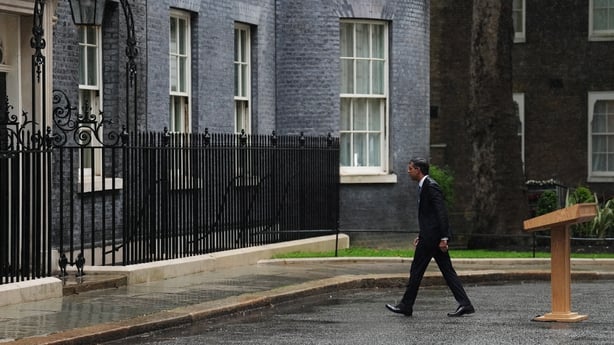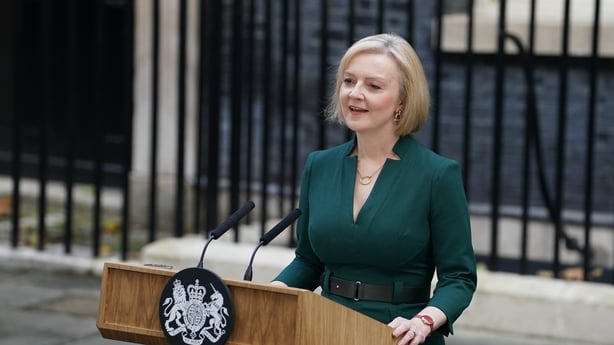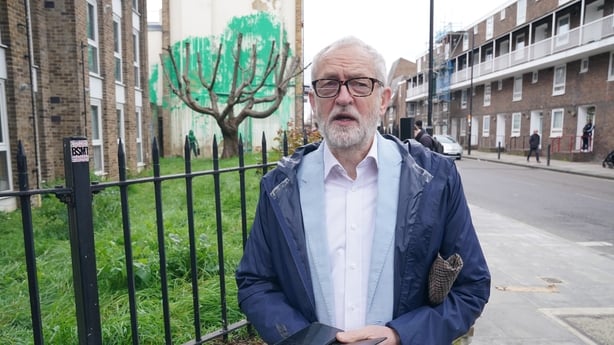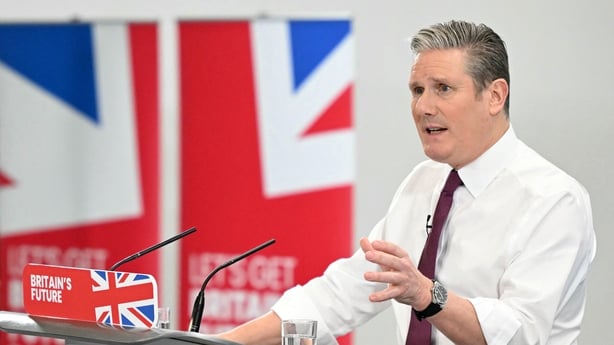It is a well-worn path from the front door of Number 10 Downing Street to the lectern on the street in front.
From prime ministerial resignations to the calling of elections, the choreography should by now be well rehearsed and perfectly executed. But as with so much in British politics in the past decade, there are always surprises.
As British Prime Minister Rishi Sunak walked out of Number 10 to call a general election on Wednesday, the first bars of "Things Can Only Get Better" by D:Ream could be heard from beyond the gates of Downing Street.
An anthem of the Labour Party landslide of 1997, the relevance of the song would not have been lost on either Mr Sunak or the large number of journalists gathered in front of him.
Added to the rain which began during Mr Sunak's speech and left him drenched by the time he returned to the prime ministerial residence, the optics of the entire event were far from ideal.

The irony is that Mr Sunak began that day with good news. Figures showing UK inflation at its lowest level in almost three years gave Mr Sunak and his Chancellor of the Exchequer Jeremy Hunt the chance to argue that their economic policies are starting to work.
Talk of a Bank of England interest rate cut this summer gave the British prime minister more reason to be upbeat than he has had in a long time. But as he competed with the rain and the music, there was little to suggest the tide had turned for him and the Conservative Party.
In power in the UK for 14 years now, the Tories are already battling against the odds.
Voters get jaded with the incumbent party. The ruling party struggles to answer why it has failed to fix all the problems, and so the inevitable desire for change begins.
For both the Conservatives and Labour, though this campaign may involve a lot of political ghosts as they seek to convince voters that they have changed, Mr Sunak must contend with the tumultuous recent past of his party.
The short-lived and ill-fated premiership of Liz Truss is blamed for exacerbating problems in the British economy, accusations the party must now either defend or skillfully side-step.

Either option looks difficult, if not impossible. As he launched his election campaign in east London, Mr Sunak argued that the Labour Party would threaten stability by raising taxes and reversing the controversial Rwanda asylum seekers policy.
But three elections in less than a decade and five leaders in the same period makes an argument about being the party of stability hard to make. And it is an argument that opposition parties will ridicule at every opportunity.
For Labour, the point of ridicule is likely to centre around the current party leader’s support of a former party leader. While some Labour MPs chose not to work directly with Jeremy Corbyn during his time in charge, Keir Starmer served in his shadow Cabinet.

Mr Corbyn, who led Labour from 2015 to 2020, has a very fractious relationship with the current party leadership. He has lost the party whip and announced yesterday morning that he is to run as an independent MP in his North London constituency at the election.
Having campaigned alongside Mr Corbyn in the past, the question Mr Starmer will face from the opposition is how could he support Mr Corbyn as a potential prime minister in recent years and now no longer consider him worthy of the party whip.
If he is not good enough now, then how did he consider him good enough then?

There are many who would say Mr Starmer’s treatment of the former party leadership shows a distinctly ruthless streak as he seeks to convince voters that Labour is a party of the centre.
While the polls might suggest a clear lead for Labour, those within the party who have witnessed and endured the last three election losses will know nothing can be taken for granted.
Those within the Tory Party who have witnessed the last three wins, albeit to varying degrees of success, know they are climbing an uphill battle.
The winner of that battle will be known in six weeks.




